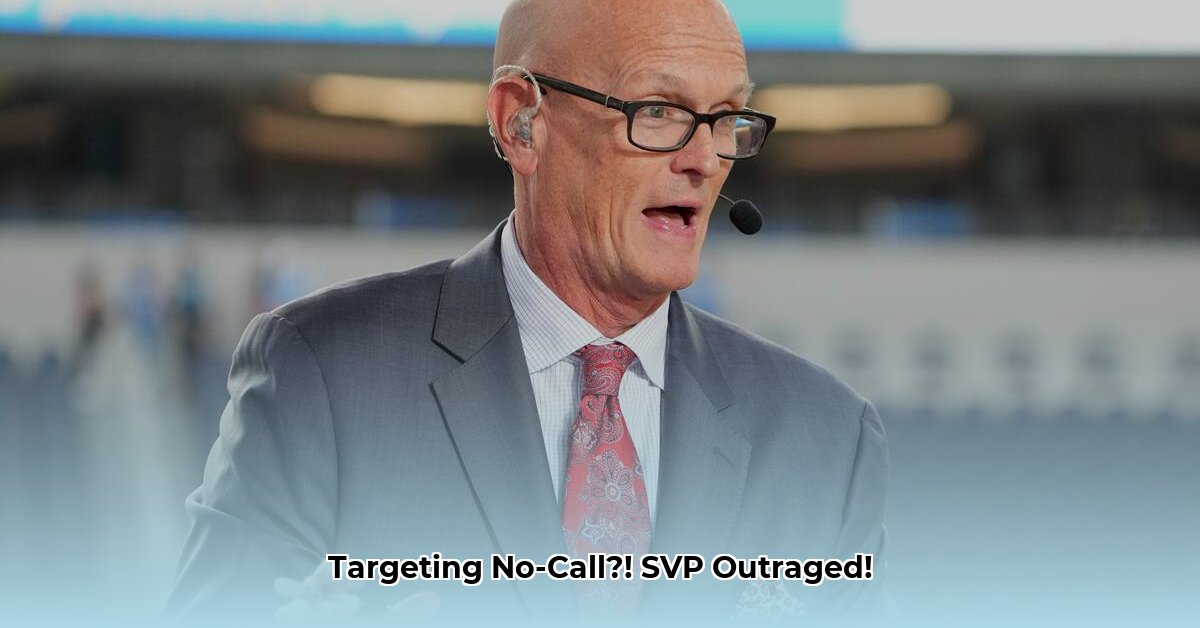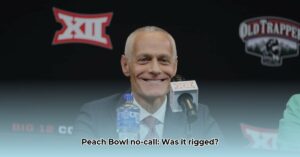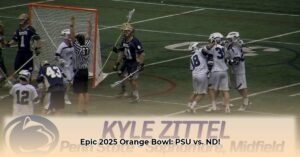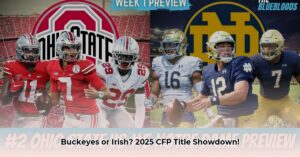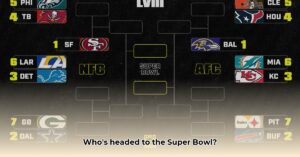The 2025 Peach Bowl, a College Football Playoff quarterfinal, was supposed to be a showcase of thrilling, high-stakes football. Instead, it became a lightning rod for controversy, thanks to a missed targeting call that sent ESPN anchor Scott Van Pelt into orbit. With the score knotted at 24-24 late in the fourth quarter, Texas safety Michael Taaffe delivered a jarring hit on Arizona State receiver Melquan Stovall. The impact, a helmet-to-helmet collision that made viewers wince, seemed like a textbook targeting foul. Yet, after a lengthy review, the officials kept their flags tucked away. The stadium erupted in disbelief, and Van Pelt, alongside analyst Dusty Dvoracek, unleashed a torrent of criticism on SportsCenter. This wasn’t just a bad call; it was, in Van Pelt’s words, “targeting a hundred times out of a hundred.”
[Insert video clip of the hit and Van Pelt’s commentary here]
Dissecting the Debacle: A Play-by-Play Breakdown
Let’s rewind to the pivotal moment. Arizona State, facing a crucial fourth down with time dwindling, needed a spark. Stovall, after making a catch, found himself in the crosshairs of Taaffe. The resulting collision left little doubt in the minds of many—including rules expert Bill LeMonnier, who confirmed to Dvoracek that the hit met the criteria for targeting. A targeting call would have meant an ejection for Taaffe and a fresh set of downs for Arizona State, giving them a prime opportunity to kick a game-winning field goal. Instead, the Sun Devils turned the ball over on downs and eventually fell to Texas 39-31 in double overtime.
Targeting 101: Decoding the Rulebook
The NCAA defines targeting as “forcible contact against an opponent with the crown of his helmet” and initiating contact to the head or neck area of a defenseless opponent. The rule, designed to enhance player safety, carries a stiff penalty: an automatic ejection and a 15-yard penalty. While the rule’s intention is clear, its application often proves murky. This ambiguity, as highlighted by the Peach Bowl incident, fuels ongoing debate about officiating consistency and the effectiveness of replay review.
Dillingham’s Despair: A Coach’s Confusion
Arizona State head coach Kenny Dillingham, grappling with the sting of defeat, voiced his bewilderment in the post-game press conference. “I don’t know what targeting is anymore,” he admitted, a sentiment that likely resonated with countless fans. His confusion underscores the challenge of interpreting a rule that often seems inconsistently applied. Did the missed call cost Arizona State the game? While it’s impossible to say with absolute certainty, it undoubtedly altered the game’s trajectory, potentially robbing the Sun Devils of a chance to seal a victory in regulation.
The Bigger Picture: A Call for Clarity and Consistency
The Peach Bowl controversy transcends a single missed call. It illuminates a broader issue within college football: the need for clearer rules, more consistent officiating, and a more effective replay review process. Van Pelt’s impassioned reaction, shared by many fans and analysts, amplified the call for change. Some propose a tiered penalty system for targeting, allowing for varying degrees of punishment depending on the severity of the hit. Others suggest dedicated targeting officials in the replay booth, tasked solely with reviewing these critical plays. While the ideal solution remains elusive, the debate sparked by Van Pelt’s outburst serves as a catalyst for much-needed reform.
Beyond the Peach Bowl: A Look Ahead
The Peach Bowl controversy might fade from the headlines, but its implications will likely linger. The incident has added fuel to the ongoing discussion surrounding officiating and player safety in college football. There are many open questions. Was the missed call a simple mistake, a product of human error in a high-pressure situation? Or does it point to more systematic issues within the officiating system? Did the replay process fail? These are important questions that the NCAA and its officials cannot ignore. Further discussions and maybe even rule adjustments are probably needed. This will hopefully lead to a game that is both exciting and safe for all players.

